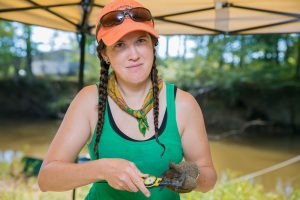
More than 70 percent of freshwater mussels are imperiled as human development has harmed river ecosystems, yet little is known about how biodiversity within species of mussels influences their function as filters and engineers of the water.
A nearly $1.8 million project, led by The University of Alabama, hopes to identify the processes and mechanisms that underlie patterns of biodiversity in these animals. This will better arm managers of environmental resources to make informed decisions for conservation and restoration efforts that benefit the entire ecosystem.
“Freshwater mussels are critical for habitat,” said Dr. Carla Atkinson, UA assistant professor of biological sciences, who is leading the project. “We have really high biodiversity in this state, and different species do different things, so you want to have high diversity if you want to maintain those biological functions.”
Along with Atkinson, the research team includes Dr. Jeff Lozier, a UA associate professor of biological sciences, as well as two researchers from the University of Mississippi: Drs. Colin Jackson, professor of biology, and Ryan Garrick, associate professor of biology.
The project is one of 10 funded through the National Science Foundation’s Dimensions of Biodiversity program to research processes in nature and their complex interactions with climate, land use and invasive species at local, regional and continental scales.
Despite centuries of discovery, most of our planet’s biodiversity remains unknown. The scale of the unknown is especially troubling given the rapid and permanent loss of biodiversity across the globe. The goal of the Dimensions of Biodiversity campaign is to transform how we describe and understand the scope and role of life on Earth.
Learn more about Dr. Atkinson’s research project by reading the full article on the UA news site.